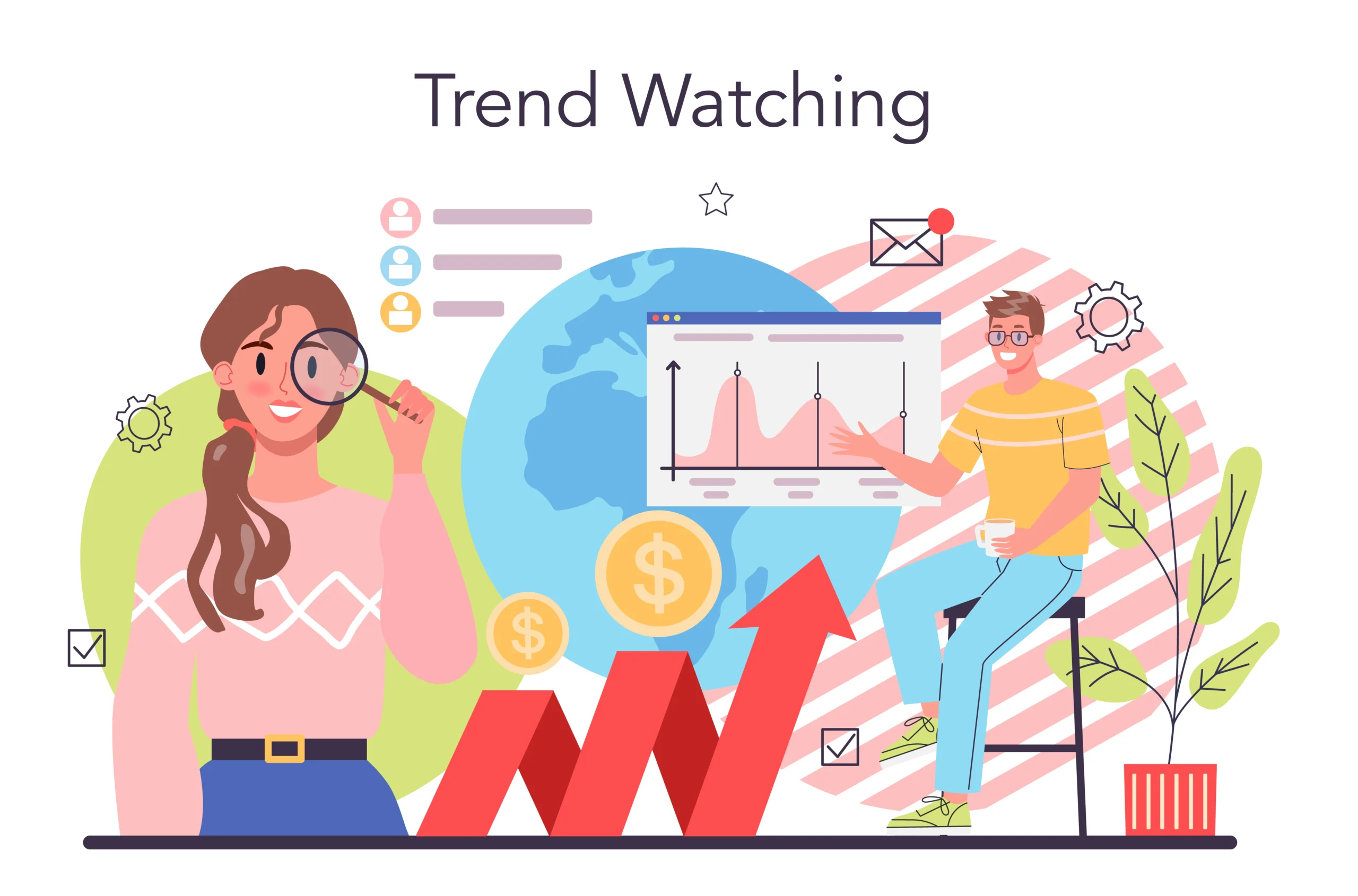The digital marketing landscape is evolving rapidly, with new technologies, strategies, and consumer behaviors reshaping the industry. As businesses adapt to the future of online marketing, staying ahead of the latest marketing trends is essential to remain competitive. In this blog post, we will explore the top digital marketing trends that are set to dominate, helping businesses prepare for success.
- 1. AI-Powered Marketing Automation
- 2. Voice Search and Conversational Marketing
- 3. Video Marketing Dominance
- 4. Augmented Reality (AR) and Virtual Reality (VR) Marketing
- 5. Social Commerce and Influencer Marketing Evolution
- 6. Blockchain for Data Privacy and Security
- 7. Sustainable and Ethical Marketing
- 8. Personalization at Scale
- 9. Omnichannel Marketing Integration
- 10. Interactive and Immersive Content
- Conclusion
- FAQs
1. AI-Powered Marketing Automation
Artificial Intelligence (AI) is revolutionizing digital marketing by enabling automation, personalization, and predictive analytics. AI-driven tools can analyze customer behavior, optimize campaigns, and provide real-time insights to enhance marketing strategies. AI will play a pivotal role in content creation, chatbots, voice search optimization, and programmatic advertising, making marketing more efficient and cost-effective.
Key Takeaways:
- AI-driven chatbots will provide 24/7 customer support.
- Predictive analytics will enhance customer segmentation and targeting.
- Automated content generation will improve efficiency.
- AI will enable hyper-personalized marketing campaigns.
2. Voice Search and Conversational Marketing
With the increasing use of smart assistants like Alexa, Siri, and Google Assistant, voice search is transforming the way users interact with search engines. Optimizing for current marketing trends such as voice search will become a necessity for businesses.
Optimization Strategies:
- Use conversational and long-tail keywords.
- Optimize for “near me” searches to capture local audiences.
- Ensure website content is structured for featured snippets.
- Create voice-friendly FAQ pages.
3. Video Marketing Dominance
Video content remains one of the latest marketing trends, with platforms like YouTube, TikTok, and Instagram Reels growing in popularity. Interactive and shoppable videos will be the next big thing, allowing users to make purchases directly through video content.
Best Practices:
- Create short-form, engaging videos.
- Leverage live streaming for real-time interaction.
- Utilize AI-powered video personalization.
- Incorporate interactive elements such as polls and clickable CTAs.
4. Augmented Reality (AR) and Virtual Reality (VR) Marketing
AR and VR are becoming mainstream marketing tools, offering immersive experiences that boost customer engagement. Brands can use these technologies for virtual try-ons, product demonstrations, and interactive advertisements.
Applications in Digital Marketing:
- Virtual stores and showrooms.
- AR-powered product testing.
- Interactive ad campaigns.
- Gamification to enhance customer engagement.
5. Social Commerce and Influencer Marketing Evolution
Social media platforms are integrating eCommerce features, enabling businesses to sell directly through social channels. Influencer marketing will continue to evolve, with micro and nano influencers driving engagement through authentic and niche content.
Trends to Watch:
- AI-powered influencer analytics.
- Integration of AR in social shopping.
- More brands using TikTok and Instagram Shops.
- Brands partnering with AI-generated influencers.
6. Blockchain for Data Privacy and Security
With increasing concerns about data privacy, blockchain technology will enhance transparency and security in digital marketing. Businesses will leverage blockchain for secure transactions, ad fraud prevention, and decentralized data storage.
Benefits:
- Enhanced customer trust and data security.
- Reduced ad fraud.
- Decentralized identity verification.
- Transparent digital contracts and transactions.
7. Sustainable and Ethical Marketing
Consumers are becoming more conscious of sustainability, and brands that embrace ethical marketing practices will gain a competitive edge. Green marketing, eco-friendly packaging, and corporate social responsibility will be key aspects of digital marketing.
Strategies:
- Promote sustainability initiatives.
- Partner with ethical influencers.
- Highlight brand values and mission.
- Reduce carbon footprint through digital advertising strategies.
8. Personalization at Scale
Consumers expect personalized experiences, and businesses must leverage data-driven insights to tailor content, recommendations, and ads.
Personalization Techniques:
- AI-driven predictive personalization.
- Dynamic website content based on user behavior.
- Email marketing automation with tailored content.
- Personalized product recommendations.
9. Omnichannel Marketing Integration
Customers interact with brands through multiple touchpoints, and integrating marketing efforts across all channels ensures a seamless experience.
Best Practices:
- Use customer data platforms (CDPs) to unify data.
- Create consistent messaging across social media, email, and ads.
- Leverage AI to optimize omnichannel campaigns.
- Utilize cross-channel retargeting.
10. Interactive and Immersive Content
Static content is being replaced with interactive formats that engage audiences.
Content Trends:
- Quizzes and polls.
- 360-degree videos.
- Augmented reality filters.
- AI-generated interactive experiences.
Conclusion
The future of online marketing is dynamic, and staying ahead of the digital marketing trends is crucial for business success. From AI-driven automation and voice search optimization to AR experiences and ethical marketing, the digital marketing landscape is constantly evolving. By adapting to these trends, businesses can enhance customer engagement, drive sales, and achieve long-term growth.
B2B IT Solutions – Your Trusted Digital Partner
At B2B IT Solutions, we provide expert digital marketing services to help businesses stay ahead of the competition. Our offerings include:
- SEO Optimization – Improve search engine rankings and drive organic traffic.
- Social Media Marketing – Boost engagement and brand awareness on social platforms.
- PPC Advertising – Maximize ROI with targeted pay-per-click campaigns.
- Content Marketing – Create compelling content that resonates with your audience.
- Web Development – Build high-performing, SEO-friendly websites.
- E-commerce Solutions – Enhance online store performance and conversions.
- Email Marketing – Increase customer retention with effective email strategies.
- AI-Powered Marketing – Leverage cutting-edge AI tools for better insights and automation.
Let us help you navigate the evolving world of digital marketing. Contact B2B IT Solutions today to stay ahead of the curve!
FAQs
What are the top digital marketing trends in 2025?
The top trends include AI-powered marketing, voice search optimization, video marketing, AR/VR experiences, social commerce, blockchain security, sustainable marketing, personalization, omnichannel marketing, and interactive content.
How will AI impact digital marketing?
AI will enhance marketing automation, customer personalization, predictive analytics, chatbot interactions, and omnichannel strategies, making campaigns more effective and data-driven.
Why is voice search optimization important for businesses?
Voice search is becoming more popular, and optimizing content for conversational queries ensures higher visibility in search engine results and improved user experience.
What role does AR and VR play in digital marketing?
AR and VR provide immersive experiences, allowing customers to interact with products virtually, leading to increased engagement and sales.
How can businesses implement sustainable marketing strategies?
Businesses can adopt eco-friendly practices, promote sustainability initiatives, use ethical influencers, reduce carbon footprint through digital advertising, and highlight their commitment to environmental and social responsibility.
By keeping up with the current marketing trends and preparing for future advancements, businesses can create impactful marketing strategies and stay ahead in the competitive digital world.

